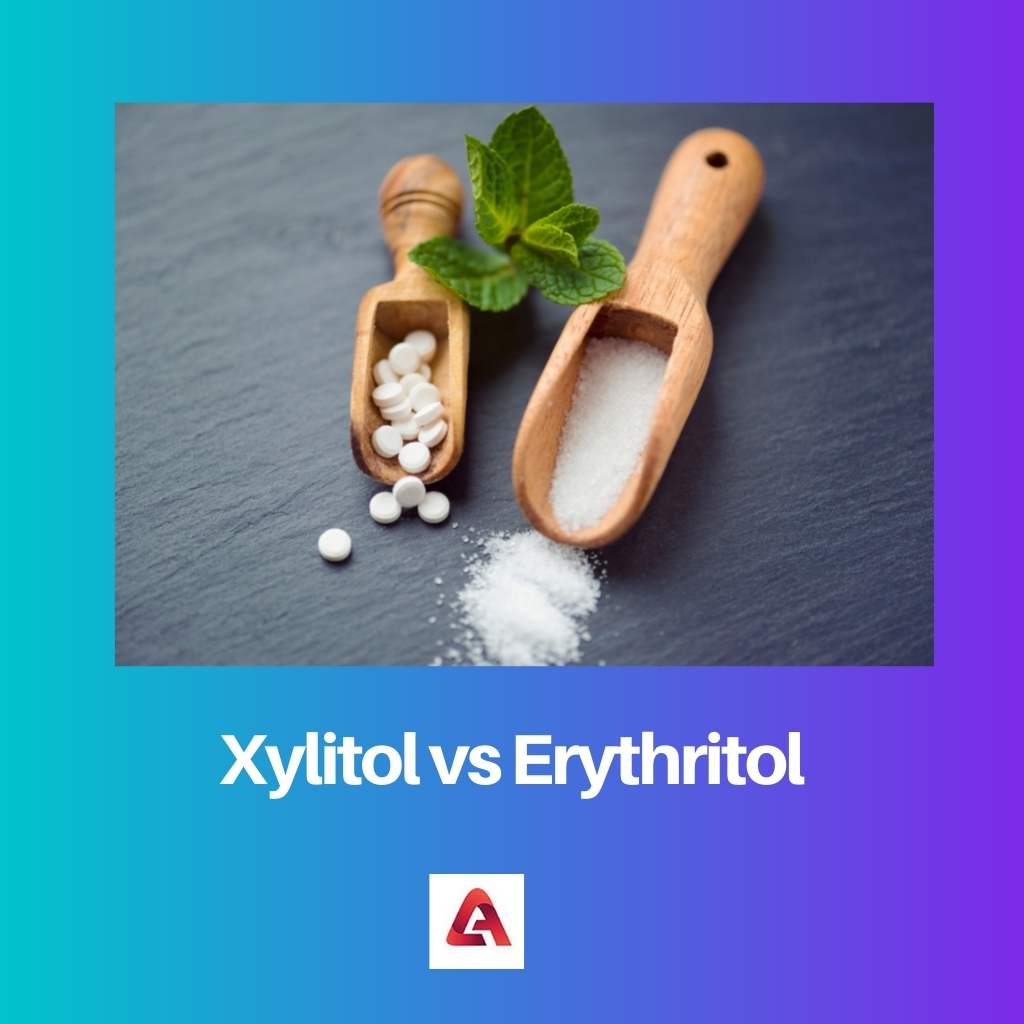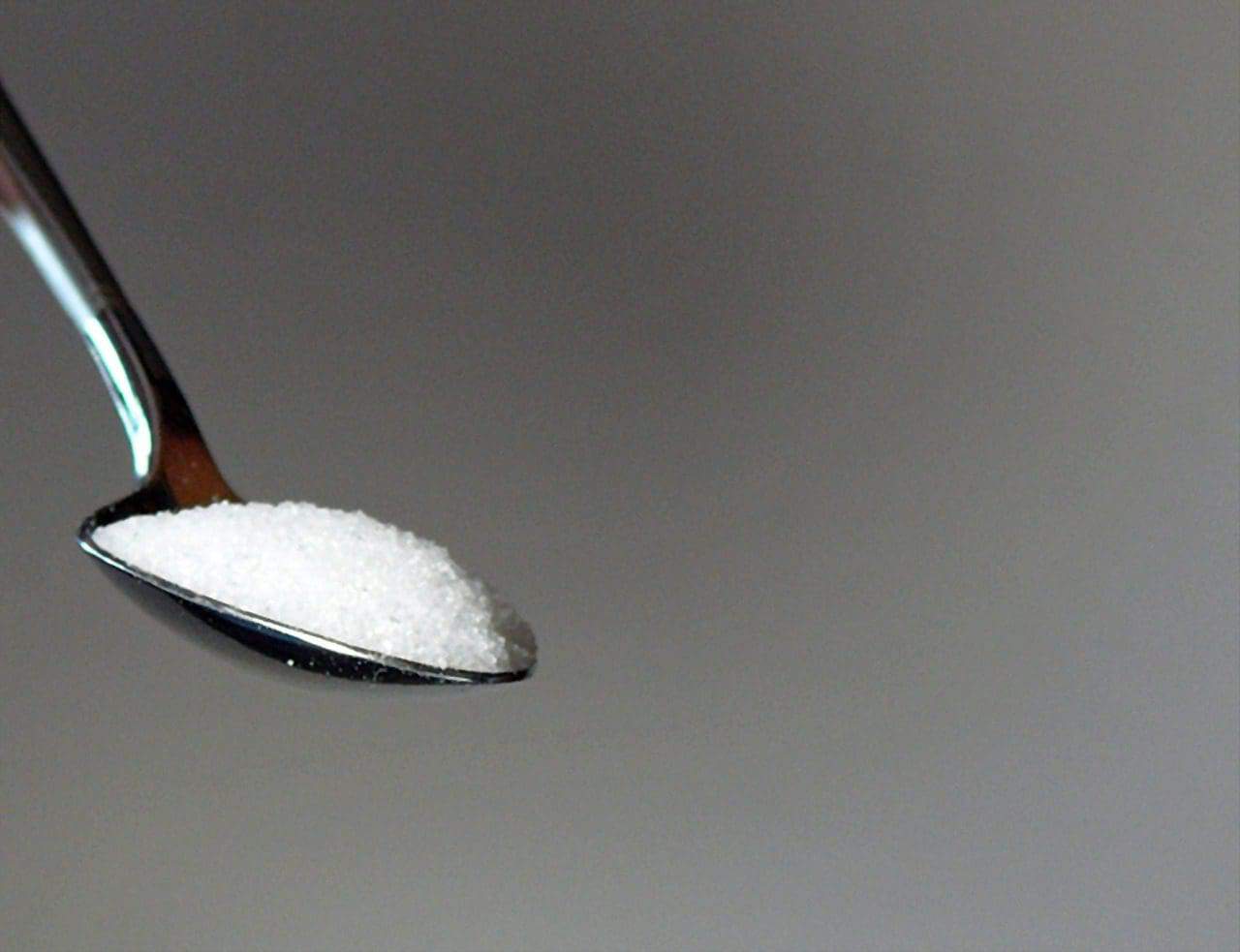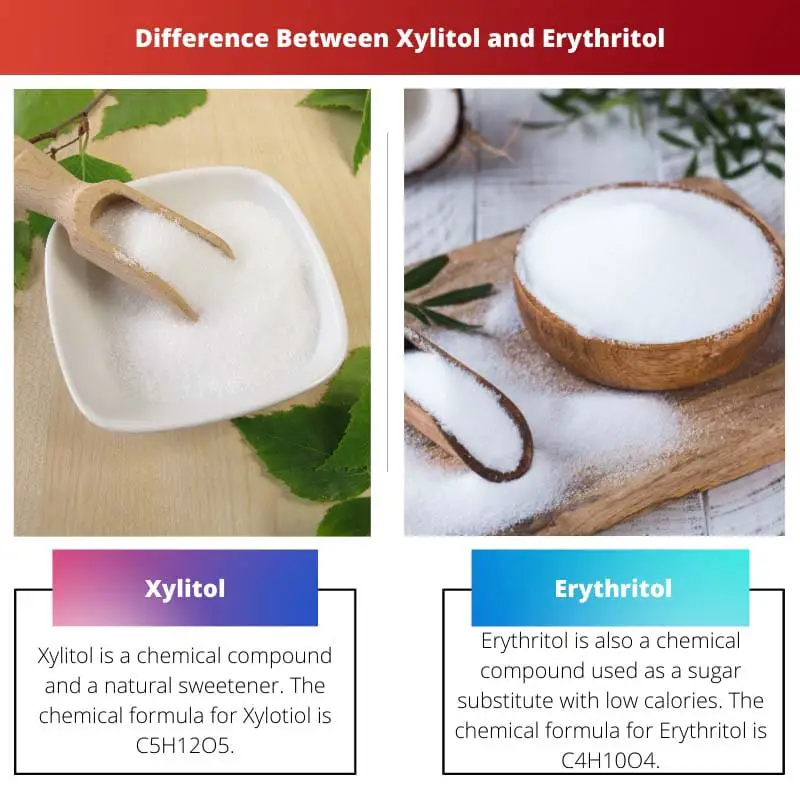Xylitol and Erythritol are both chemical compounds. And they both are sugar alcohols (alcohol here refers to the chemical structure) used as an alternative to sugar, however, they are very much different from each other.
They are mostly found in plants and fruits. Their chemical formulas differ and, therefore, their properties as well.
Key Takeaways
- Xylitol and Erythritol are sugar substitutes used as alternatives to traditional sugar.
- Xylitol has a lower glycemic index than Erythritol, meaning it has less impact on blood sugar levels.
- Erythritol is less likely to cause digestive issues than Xylitol, which can cause bloating and diarrhea in some people.
Xylitol vs Erythritol
The difference between Xylitol and Erythritol is the chemical formula of both chemical compounds. The chemical compound for Xylitol is C5H12O5, and for Erythritol is C4H10O4. Also, Xylitol is 100% as sweet as sugar, while Erythritol is just 70% as sweet as sugar.

Xylitol is mainly extracted from corncobs. And is mostly found in vegetables and fruits like strawberries, pumpkin, cauliflower, plums, etc.
Xylitol has 40% fewer calories than that sugar, but it is 100% as sweet as sugar. A person can easily reduce their carbohydrate intake without reducing their sweets intake.
Xylitol is toxic for some animals, like dogs.
Erythritol is mostly found in vegetables and, fruits, fermented foods. It is used as a flavour enhancer in food and beverage products like soft drinks and dietary supplements etc.
It is 70% as sweet as sugar. Erythritol is easily digested and has a low glycemic index.
Comparison Table
| Parameters of Comparison | Xylitol | Erythritol |
|---|---|---|
| Chemical Formula | The chemical formula for Xylitol is C5H12O5. | The chemical formula for Erythritol is C4H10O4. |
| Sweetness | Xylitol has 100% sweetness as sugar in taste and volume. | Erythritol has 70% sweetness as sugar. |
| Low calories | Xylitol has 40% fewer calories than sugar. | Erythritol has 95% fewer calories than sugar. |
| Glycemic Index | Xylitol has a glycemic index of 7. | The glycemic index of Erythritol is zero. |
| Natural occurrence | Xylitol is naturally found in berries, strawberries, pumpkins, cauliflower, plums, etc. | Erythritol is naturally found in grapes, cantaloupe, pears, melons, etc. |
What is Xylitol?
Xylitol is a chemical compound and a natural sweetener. The chemical formula for Xylotiol is C5H12O5. It is a chemical compound of polyalcohol structure.
It is used as an alternative to sugar as it has low calories. It is also used as a food additive in many edible products.
Xylitol is extracted from hardwood trees, softwood trees, and some agricultural waste which is obtained by processing maize, wheat, or rice. Corncobs are considered a preferred source of Xylitol.
Indeed, it is also found in many vegetables and fruits, such as berries, strawberries, pumpkins, cauliflower, plums, etc. It is mostly used as sugar in products like drugs, toothpaste, chewing gum, dietary supplements, etc.
Xylitol, if taken excessively, can have side effects on your gastrointestinal system and can induce laxative effects. It doesn’t have any effects when having normal absorption, and it doesn’t have any effect on blood sugar as well.
Xylitol has as much sweetness as sugar or sucrose; however, it has 40% fewer calories. And it also prevents tooth decay and other dental cavities.
The glycemic index of Xylitol is 7. GI is a value that is used to measure how much a food item increases blood sugar levels. The less the GI, the less it will affect the blood sugar level in a person.

What is Erythritol?
Erythritol is also a chemical compound used as a sugar substitute with low calories. The chemical formula for Erythritol is C4H10O4.
The tradename for erythritol is Zerose.
Erythritol has 95% fewer calories than sugar. It has only 0.2 calories per gram.
Erythritol is produced by fermenting another natural sugar like glucose. Erythritol is found in many fruits and vegetables like grapes, cantaloupe, pears, melons, etc.
And in some of the fermented foods as well. Erythritol has a better aftertaste and doesn’t lead to tooth decay.
Erythritol has no effect on blood sugar and blood insulin levels, and therefore it can be used as a sugar substitute for patients with diabetes.
However, the excessive use of erythritol can cause mild side effects on your gastrointestinal system.
Intake of Erythritol doesn’t develop tooth decay, plaques, or caries as it suppresses the growth of oral bacteria. And it also causes less acidity and flatulence.
Erythritol has a very low glycemic index, almost zero. Erythritol is a carbohydrate, but it doesn’t metabolize into glucose and therefore doesn’t affect your body’s insulin levels.
Erythritol adds moisture and a shiny effect in chocolates or other daily milk products and improves the shelf life of baked goods.

Main Differences Between Xylitol And Erythritol
- Xylitol contains 40% fewer calories than sugar, while Erythritol contains 95% fewer calories than sugar. Xylitol has 2.4 calories per gram, while Erythritol has 0.2 or 0 calories per gram.
- Xylitol has a higher GI than Erythritol.
- Xylitol doesn’t have an aftertaste, while Erythritol has a better aftertaste.
- Xylitol is 100% as sweet as sugar, while on the other hand, Erythritol is 70% sweet.
- Xylitol can have side effects like gas, bloating, diarrhoea, irritable bowel syndrome, and digestive stress. In contrast, Erythritol causes fewer gastrointestinal side effects.
- Xylitol is said to be poisonous for dogs and animals, while Erythritol is not.

- https://www.tandfonline.com/doi/abs/10.1080/10408398.2019.1623757
- https://www.nature.com/articles/s41598-020-63153-x

The breakdown of Xylitol and Erythritol is incredibly informative.
I’m impressed by the scientific rigor and clarity in this article.
This is a comprehensive and insightful look at Xylitol and Erythritol.
The depth of knowledge in this article is truly remarkable.
I couldn’t agree more. This is a top-notch analysis.
The detailed description of both Xylitol and Erythritol is wonderfully elucidating.
I couldn’t agree more. This article is an excellent resource.
The scientific depth in this piece is commendable. Well done.
The information provided here is of high quality and great educational value.
Absolutely, articles like this are incredibly beneficial for readers.
I’m impressed by the level of detail and accuracy in this piece.
I found the detailed explanations of Xylitol and Erythritol very valuable.
Absolutely, the benefits and potential side effects are well-delineated.
This is an impressive analysis of these sugar substitutes. Much appreciated.
The comparison table is very helpful in understanding the differences between Xylitol and Erythritol.
The table makes it easy to see key differences at a glance.
I concur, the clarity and precision in this article are outstanding.
I appreciate the breakdown of the chemical formulas and comparison of sweetness levels.
This information is essential for making informed dietary choices. Thank you!
This really helps to understand the science behind Xylitol and Erythritol.
I’m glad to have found such a well-researched piece on these sugar alternatives.
This is vital information for health-conscious individuals. Thank you for sharing.
The scientific insights here are truly enlightening. Thank you!
Informative article explaining the key differences and similarities between Xylitol and Erythritol.
I agree! It’s great to have this clear comparison.
Very well written and detailed. Thank you.
An excellent article offering a wealth of information on these sugar substitutes.